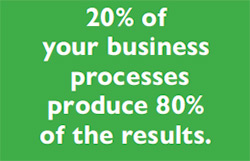Why Fabricators Should “Systemize the Predictable”
Katherine Gifford
Moraware
 Whenever someone mentions building out processes for your company, many managers get a look of terror in their eyes and run for cover, thinking about 500-page SOP manuals and nitpicking every single detail of their operation. But streamlining your shop doesn’t have to be so painful, or inefficient!
Whenever someone mentions building out processes for your company, many managers get a look of terror in their eyes and run for cover, thinking about 500-page SOP manuals and nitpicking every single detail of their operation. But streamlining your shop doesn’t have to be so painful, or inefficient!
One of the best ideas about building processes comes from Gino Wickman, the creator of the Entrepreneurial Operating System (EOS). It’s amazing, so prepare yourself! Ready?
“Systemize the predictable, so you can humanize the exceptional.”
Let that sink in. Yes, there will be some “nitpicking” to create standard operating procedures but, according to Wickman, you don’t have to systemize everything — like that process-developing nightmare going on in your head right now.
Let’s break down the quote to really get to the genius behind it. What the heck does that mean!?
The basic goal behind EOS is to optimize your company’s productivity. And one of the core components of EOS is process.
Countertop fabricators at every level know the importance of doing processes the same way every time. It maintains quality, ensures efficiency, and reduces reworks. The part that makes everyone want to doze off is building multi-page SOPs that nobody wants to read. Where does one even find the time?
When Wickman says, “Systemize the predictable, so you can humanize the exceptional,” he’s breaking your processes down into two parts: the predictable, and the unpredictable. In the same vein, let’s break down the quote into two pieces.
Systemize the Predictable…
There are plenty of processes in your countertop fabrication operation that you know forwards and backwards. There aren’t any surprises. You and your team know exactly what’s going to happen at every step. These are your predictable processes.
For example, a great predictable process in a countertop fabrication shop is preparing a customer for their template appointment. This should be done the same way each time with little to no variation.
Because you know exactly what’s coming next in the process, it’s easy to see the steps and turn them into a handy SOP for everyone on your team to follow. If you can easily predict the process, that’s where you should spend your time Systemizing.
…So you can Humanize the Exceptional
There’s one computer in your shop that can think creatively and solve problems better and faster than anything in the world, and everyone in your shop has access to it: the human brain! When you think about people as a whole, we’re pretty smart. Let the most advanced supercomputer ever built do its job!
When you only systemize your predictable, core processes (and not everything), you leave room for you and your team to use your brains. For shop workers, that might be identifying more efficient ways to fabricate countertops. For salespeople, perhaps they can spend more time with their customers and showcase their money-making personalities. Managers can spend more time learning about their employees and building a positive work environment. You might even be able to identify opportunities your SOP-happy competitors might have missed.
Massive SOPs that attempt to control every minute aspect of the operation only lock people in boxes.
If you have the greatest computer ever made at your disposal, why would you want to put limits on it? When you systemize only the predictable, it gives you space to humanize the exceptional and take your business to the next level.
Tips to help you systemize the predictable at your countertop fabrication business
Saying one big fancy quote from some entrepreneurial expert sounds great, but how do you take the words and put them into action at your countertop fabrication business? Here are a few tips to help you systemize the predictable, so you can humanize the exceptional:
• Identify your core processes.
We’ve all seen SOP documents that cover hundreds of processes and fill entire binders (or even filing cabinets), but how many processes are really essential for your business to operate? If your operation is like most businesses, there are likely only a few key processes that keep the wheels turning. These are your Core Processes, and they’re the only ones you should focus on systematizing.
Take some time to identify your Core Processes. It’s not unheard of for some companies to have as few as six core processes! A lot of folks tend to overcomplicate their processes and then as you grow, it is scary to look at them. Talk about chaos…
• Document and simplify core processes
Once you know the Core Processes that make your little countertop world go ‘round, it’s time to document. Yes, it’s time for the fun part!
Get out your pen and paper, and write out your core processes step by step. Focus on the predictable parts of the processes, just like the quote says.
When you have your SOP written from top to bottom, simplify it. You want your systems to be as simple as possible. Record only the major steps of the process that have to happen in order to achieve consistent, quality results.
Many businesses can simplify their Core Processes into about 1-3 pages. You want your SOPs to be simple, clear, and easy to follow.
 • Follow the 20/80 rule
• Follow the 20/80 rule
It’s a common belief in the business world that 20% of the people do 80% of the work. While that may or may not be true, Wickman likes to apply the 20/80 rule to your processes. He says that 20% of your business processes produce 80% of the results.
Focus most of your systematizing energy on the 20% of your processes and leave the rest to “humanizing.” It’ll have the largest impact on your business and still leave 80% of your business processes open to creativity and exceptional thought. That’s the true way to create SOPs that are efficient, effective, and don’t drive everyone in your shop absolutely nuts!
So where do you start now?
The first step to any form of organizing your business is to look at the way you are currently doing things. Ask yourself “What is working?” and “What is not working?” We also like to ask the folks that come to us for a demo, “What is the cost of not changing?”
If your answers to those questions lead you to believe that you could use some process organizing and streamlining of those said processes, check out the Moraware software that is quite literally called Systemize. How fun is that? Moraware job management and scheduling software allows thousands of fabricators to use their creativity to keep improving the way they run their business all the way from quoting to install.
Katherine Gifford is the Marketing Manager at Moraware. Visit her blog at www.moraware.com .